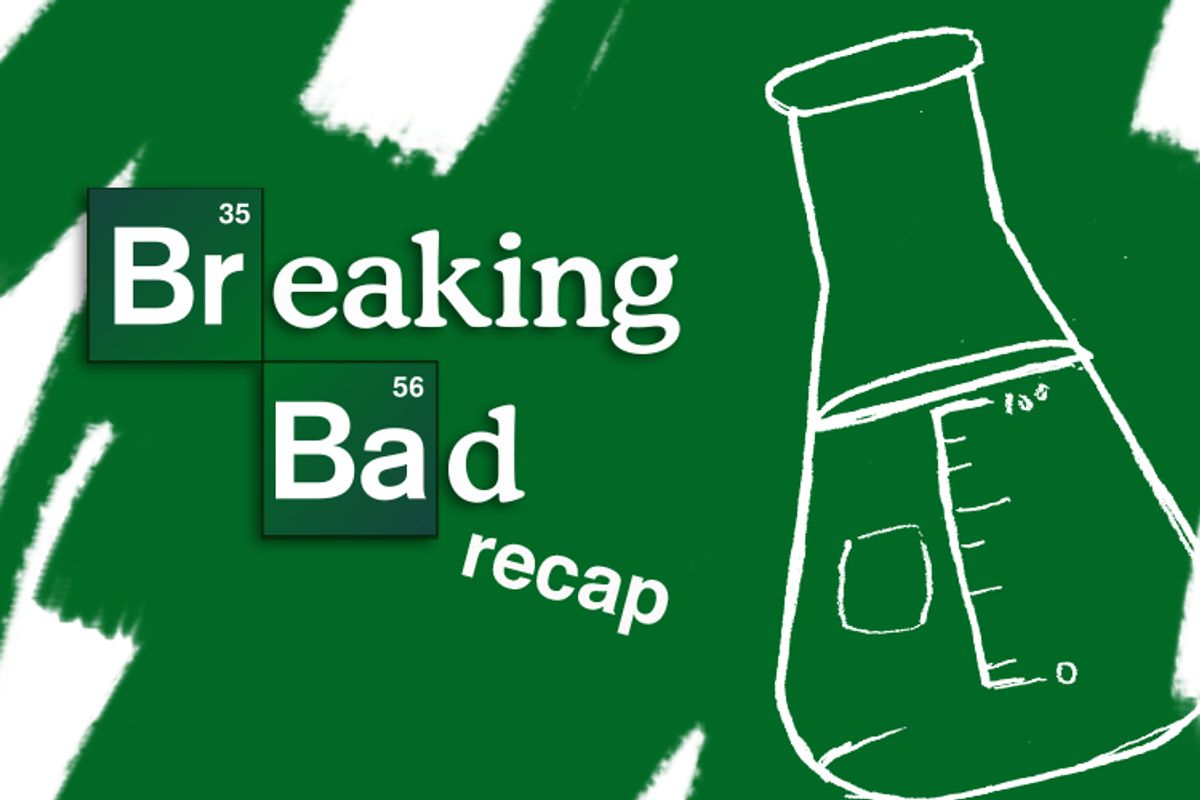[SPOILER WARNING: Do not read this recap unless you watched last night's "Breaking Bad" and are familiar with the plot of the rest of the series.]
"Thirty-eight Snub" is a ramping-up episode of "Breaking Bad," one in which a lot threatens to happen but not much actually does. It's set during the aftermath of a series of shocking, pivotal events at the end of last season and the beginning of this one. Following Gus' shocking murder of Victor (for being careless and for getting made at a crime scene) all of Gus' people are walking around in a fog.
And the rest of the "Breaking Bad" characters seem equally fragile, even the ones who are only tangentially connected (like Skyler) or who exist in separate universes (Hank and Marie). It's an episode about frustration, failure, stasis and waiting.
Hank seems to take forever to go 20 steps with his walker, celebrates with a round of high-fives, then immediately settles into depression again, with only his increasingly frustrated, unhappy wife to keep him company. Walter White buys a gun and seems to be looking for an excuse to kill his boss; near the beginning of the episode, Walt tells Mike he just wants to "clear the air," but his furious, terrified expression suggests that what he'd really like to do is clear the air -- and the planet -- of Gus. Jesse is depressed and looks utterly lost; he's still traumatized (like Walt), numbing his terror over the lab murder and his lingering guilt and horror over his first murder by purchasing a gigantic stereo and an automated room cleaner and throwing a three-day party at his house. ("Breaking Bad" has always had a knack for satirizing American consumerism in shots rather than with dialogue, and this episode was packed with such images; my favorite is that wide shot of Jesse's living room -- Jesse and his buddies standing in front of the stereo like the "2001" apes worshiping the monolith, the vacuum cleaner zipping along the floor.) Skyler hatches a plan to buy the car wash for Walt but is rebuffed by the owner (who wants $20 million as compensation for being humiliated by Walt in the pilot).
And what's going on with Mike? Did that speck of blood on his sleeve belong to Victor, or to Gus? What did he mean when he told Walter that he wouldn't be seeing Gus again? His savage beatdown of Walt in the bar was clearly sending some kind of message, but what was it? "Don't play cowboy, Mr. Chemist, you're in over your head"? Or was it, "Get back to work. Gus is gone/dead. I am the new boss"? These questions were only partly hinted at in that smashing final scene; the episode had one of the best shots in the show's brief history, a God's-eye view of Walter in the middle of the street, an insignificant speck. (Episode director Michelle McClaren and writer George Mastras are a great team.)
Like last week's episode, "Box Cutter," and like some of the better Season 3 episodes, this one restricted itself to very few scenes and sequences but luxuriated in them, allowing the characters (and the viewer) time to experience the tiny eddies and currents of the moment: Jesse sitting teary-eyed in front of the sub-woofer in his empty house; Skyler very coolly laying out the terms of the car wash purchase and then being summarily dismissed (and hearing her husband's manhood insulted); Walt crossing that dark street and then getting a preemptive phone call warning him to back off. Albuquerque has never seemed more scarily depopulated than it did in this episode. Except for the party scenes (in which the guests were just a blur of bodies) the city seemed to have about a dozen inhabitants. The way it was photographed, it looked operatically huge, like a town in a Sergio Leone movie, with barrooms and living rooms the size of airplane hangars and suburban streets that looked a half-mile wide. When the camera settled behind Walt's head for that long walk across the street, I half-expected the sound designer to drop in the sound of spurs jangling.
How fitting that Jim Beaver -- aka Ellsworth the prospector on "Deadwood" -- would drop for a cameo as the dealer who sold Walt the gun with the filed-off serial number. It was a great stand-alone scene that established the show's modern western bona fides, and that allowed incidental echoes of "Deadwood" to creep into the dialogue via winding run-on sentences and strangely quaint locutions. "This is the west, boss," the dealer tells Walt. "New Mexico's not a retreat jurisdiction. Man steps to you bent on doing you bodily harm, you got every right to plant your feet and shoot to kill. Some call it a moral right, and I do include myself within that class. All this to say I'm happy to take your money, but if you're not a convicted felon, you might best be advised to bear your arms within the confines of the law."
"It's for defense," Walt says. "Defense. I'll take it."
If only.

Shares